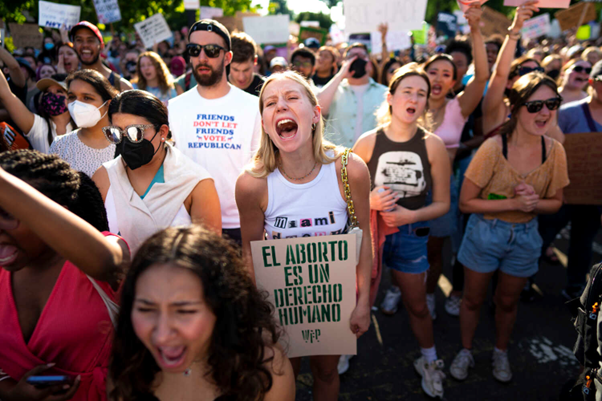By Nikita Suharu
“We claim that woman should have the right over her own body and to say if she shall or if she shall not be a mother, as she sees fit.” (Sanger 38) Margaret Sanger said this to the public of NYC in 1912, approximately 100 years ago, to discuss the morality of birth control. And this year, it has become aware that women are still fighting the government and protesting for the same thing: basic human rights. “Sexual and reproductive health and bodily autonomy are basic human rights that all governments have a duty to respect, protect and fulfill.” (PAI) On Friday, June 24 2022, the US Supreme Court overturned Roe vs. Wade, a regulation providing access to abortions.
In 1973, by the time of Roe vs. Wade, Hawaii, New York, Alaska, and Washington were the only states to legalize abortion. In 1969, Norma McCorvey, a Texas women in her early 20s, was looking to have an abortion. She could have traveled to another country to legally and safely have an abortion if she had the financial means, a common issue then and now. The estimated illegal abortions in United States in the 1950s-60s was 200,000 to 1.2 million per year. McCorvey was referred to Texas attorneys hoping to challenge anti-abortion laws. In court, she became known as “Jane Roe”. Her attorneys filed a lawsuit on behalf of McCorvey and other women who wanted options, against Henry Wade, a district attorney. The Texas court ruling stated the ban was illegal since it violated the 14th amendment, the right to privacy. Yet, in 1973, after the case had been appealed to the U.S. Supreme Court, a 7-2 decision was made understanding that the right to abortion was implied under the 14th amendment right to privacy, and abortion was legalized nationwide. On June 24, 2022, abortion was no longer a federal constitutional right.
The overturn of Roe V. Wade doesn’t just affect women, but doctors as well, who are at risk of being criminalized for preforming abortions. Louisiana governor, John Bel Edwards signed a trigger law that would go into effect immediately after Roe fell. Under the law, doctors would face up to 15 years of imprisonment for providing an abortion in any case, with no exception of rape or incest. Yet, the federal penalty for rape is only a maximum of 20 years of imprisonment. A doctor hoping to help a victim with an unwanted child, the result of a serious offense, is seen as a criminal act equal to the offense.
Immediately after the overturn of Roe Vs. Wade, the decision was met with angry mobs on that Friday afternoon. Protests erupted in Washington, New York, and many other city squares across the United States. Outside the Supreme Court, a gathering of outraged abortion rights demonstraters grew to thousands by the evening. Clinics were discussing plans to reopen elsewhere, protesters were gathering with signs, wearing clothing with “1973” written on it, fighting for women’s lives that would be destroyed as a result of the Supreme Court’s decision. Governor Janet Mills, standing before hundreds of protesters in City Hall, states, “The ruling will do nothing to stop abortion, It will only make abortion less safe and turn back the clock.” (The New York Times) Her claim can be supported by the rates of illegal abortions in the 1950s. The overturn will only change the fact that financially unstable women will again have to resort to unsafe drugs for abortion, risking their bodies and their lives.
Women’s rights have been a constant struggle for generations. The fight for freedom of our own bodies and having safe options shouldn’t even be a fight, yet hundreds of lives are destroyed because of the decisions made by our fair and just government. The dangerous acts and risks to the lives of many women in 1973 was fought for and won by attorneys who challenged anti-abortion laws. The Supreme Court had justified the right to an abortion under the 14th amendment, as citizenship rights. Their win was overturned on June 24, 2022, when the Supreme Court decided to make the act of abortion a criminal offense. Abortion is no longer a federal right, this decision endangering women and doctors’ lives across the States. Will the protests of thousands change the Supreme Court’s mind? Will women win their fight again like in 1973? Will the Government ever move forward in time instead of repeating history’s mistakes? It is the hope of millions across the country that the government realizes our body belongs to ourselves, our rights should be protected not threatened, our options should be safe, legal, unlimited, and our decisions should be our own.

